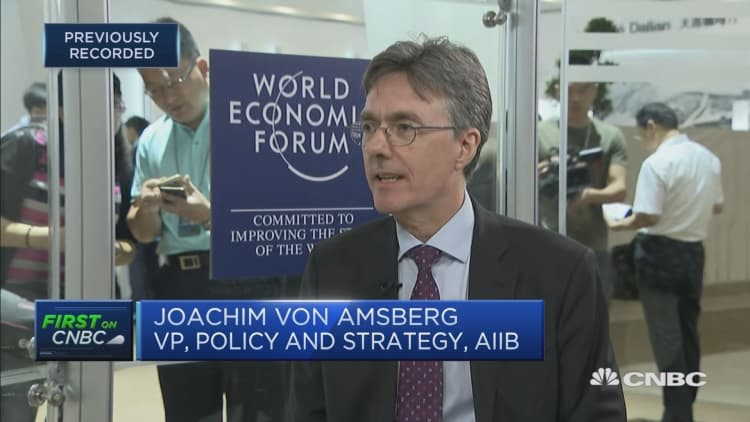
Emerging economies must undertake "good project analysis" before taking on debt to fund infrastructure upgrades, according to the Asian Infrastructure Investment Bank (AIIB).
"The capacity to take on debt to invest allows countries to grow faster, but only if they invest well," Joachim von Amsberg, vice president of policy and strategy at the China-led investment bank told CNBC on Tuesday at the World Economic Forum. A project's ability to generate strong economic returns should be the biggest determining factor for governments, he added.
His comments come as criticism mounts on China's globe-spanning infrastructure program known as the Belt and Road Initiative.
One of the biggest complaints about the project is its reliance on Chinese workers and unsustainable loans which many participating nations may not be able to afford in the long term.
If emerging economies can't generate enough cash to pay the interest on China's loans, Beijing may seek economic or political concessions as compensation as was the case with Sri Lanka. The phenomenon has been dubbed debt-trap diplomacy, which Chinese President Xi Jinping's administration has denied engaging in.
Despite those financing risks, many African leaders have said capital from China remains the best means to develop their respective economies.
For infrastructure-focused lenders such as the AIIB, there are crucial questions that need to be answered before investing, according to von Amsberg.
"Ask whether the project is financially viable, whether it brings economic benefits, whether it's environmentally sound, whether the sponsor or the government can afford the debt that is needed to make these investments," the economist stated.
That's how the AIIB approaches investments, he said.
The Belt and Road initiative is comprised of various projects and "in the end, you have to look at every project on its own merits," he added.
The AIIB has 87 approved members. While Beijing remains the largest shareholder, it holds only 25 percent of shares with regional members taking the remaining voting power.
Asked whether the ongoing tariff war between Washington and Beijing would impact Asia's infrastructure needs, von Amsberg said: "The hundreds of millions of people who don't have power need to be attended to, they are not affected by short-term tensions."

